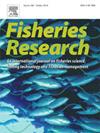A typology of recreational sea anglers in England and Wales
IF 2.2
2区 农林科学
Q2 FISHERIES
引用次数: 0
Abstract
Understanding diversity among anglers is a key aspect of effective fishery management. Typologies are coherent models best describing heterogeneity in populations and have been used extensively to understand sea angler responses to management and policy. Typologies can also aid the assessment of bias in non-probabilistic sampling, as part of recreational sea angling monitoring, through the inclusion of metrics beyond those based on days fished, location and gear. There is no standard approach to the formation of typologies and, historically, the UK has lacked a suitable description of recreational sea angler diversity to inform both sector monitoring and the development of fishery policy post-Brexit. This study developed and employed a wide-ranging data collection framework to form the first ever typology of recreational sea anglers in England and Wales. The typology is based on principal component and cluster analysis of 472 angler survey questionnaires, follow-up interviews, and was validated using a unique qualitative verification method. Variance was represented by ten components reflecting variable groupings across the data collection framework. Drawing on the components and several independent validating variables, the typology comprised: consumers; trophy anglers; leisure-identity anglers; and social anglers. Value-based and attitudinal metrics performed better than behavioural variables. Domains of angler ‘involvement’ showed strong performance as markers of variance in the sample. Specialisation variables proved less useful as summary indices that reflected sample variance. Methodological suggestions are provided for integrating the typology in future monitoring assessments in addition to applied examples of how the typology informs the implementation of management measures.
求助全文
约1分钟内获得全文
求助全文
来源期刊

Fisheries Research
农林科学-渔业
CiteScore
4.50
自引率
16.70%
发文量
294
审稿时长
15 weeks
期刊介绍:
This journal provides an international forum for the publication of papers in the areas of fisheries science, fishing technology, fisheries management and relevant socio-economics. The scope covers fisheries in salt, brackish and freshwater systems, and all aspects of associated ecology, environmental aspects of fisheries, and economics. Both theoretical and practical papers are acceptable, including laboratory and field experimental studies relevant to fisheries. Papers on the conservation of exploitable living resources are welcome. Review and Viewpoint articles are also published. As the specified areas inevitably impinge on and interrelate with each other, the approach of the journal is multidisciplinary, and authors are encouraged to emphasise the relevance of their own work to that of other disciplines. The journal is intended for fisheries scientists, biological oceanographers, gear technologists, economists, managers, administrators, policy makers and legislators.
 求助内容:
求助内容: 应助结果提醒方式:
应助结果提醒方式:


